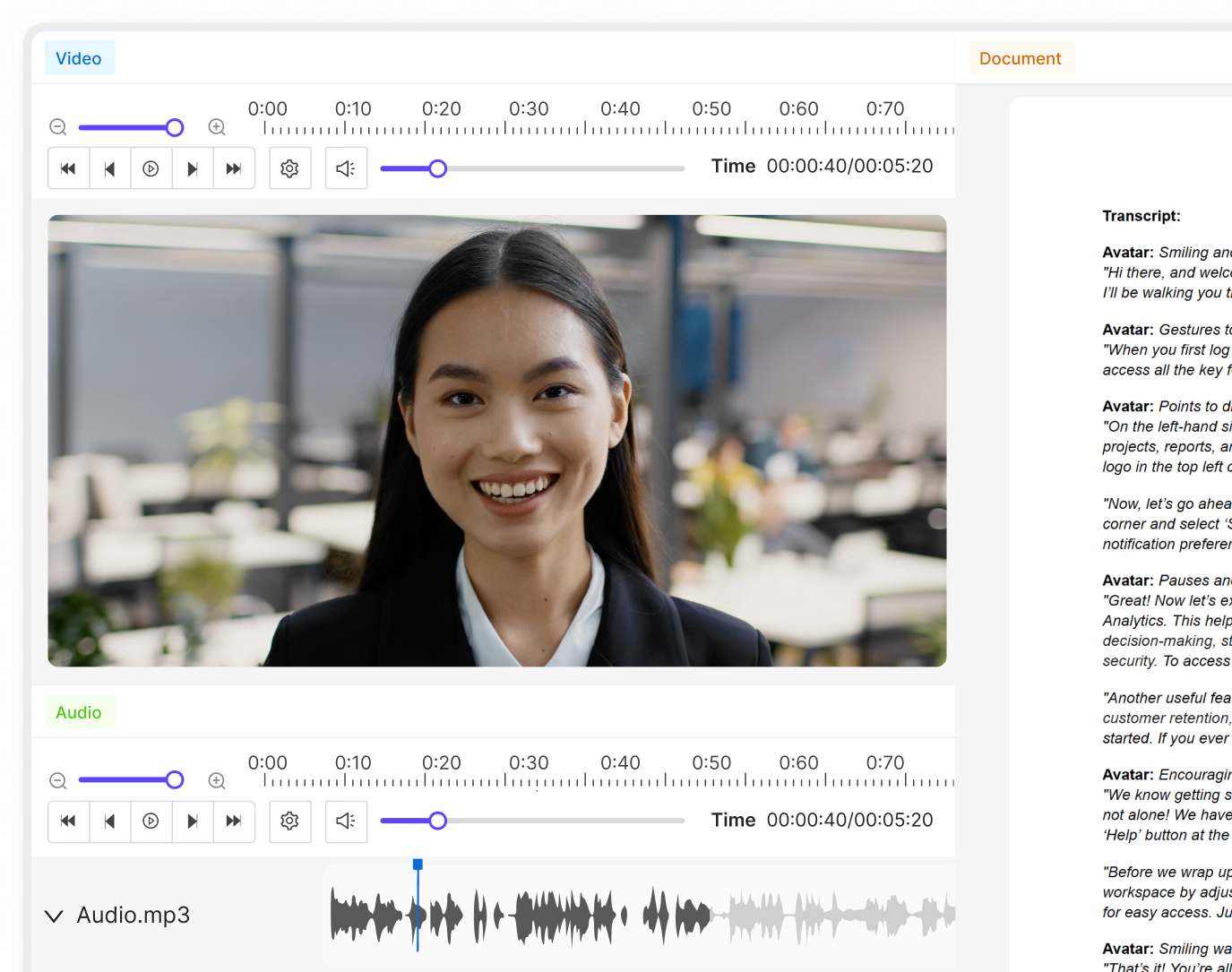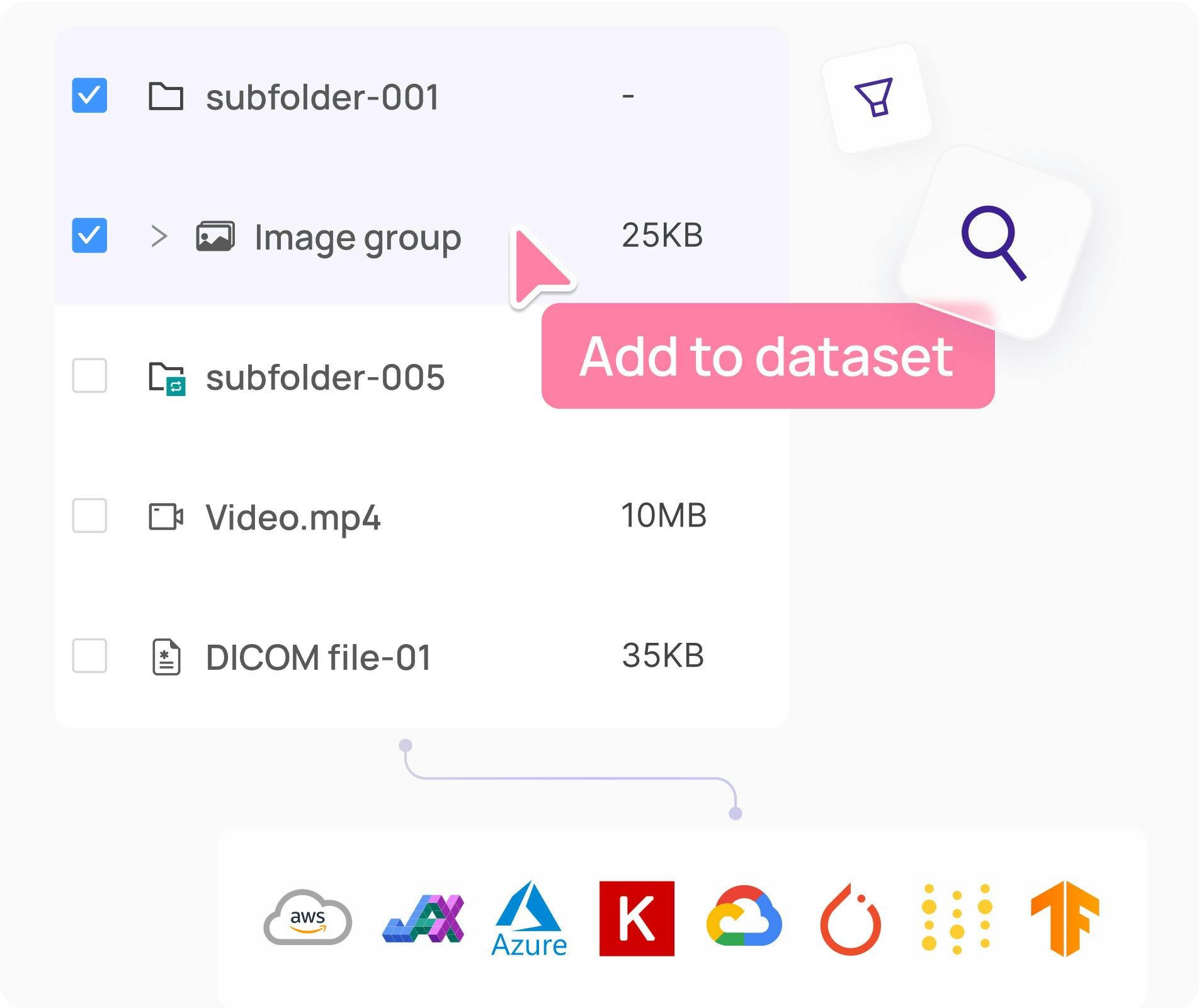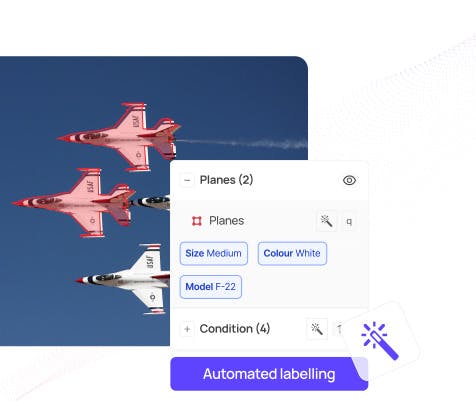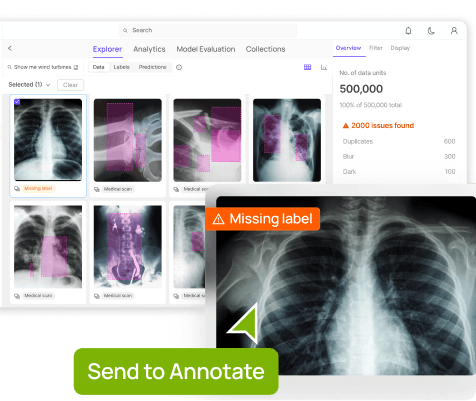Contents
Lightly AI
1. Encord Active
2. Scale AI
3. iMerit
4. Dataloop
5. SuperAnnotate
6. Labelbox
7. Aquarium
8. Voxel51
9. Aporia
10. Picsellia
Lightly AI Alternatives: Key Takeaways
Encord Blog
Top 10 Alternatives to Lightly AI [2025]
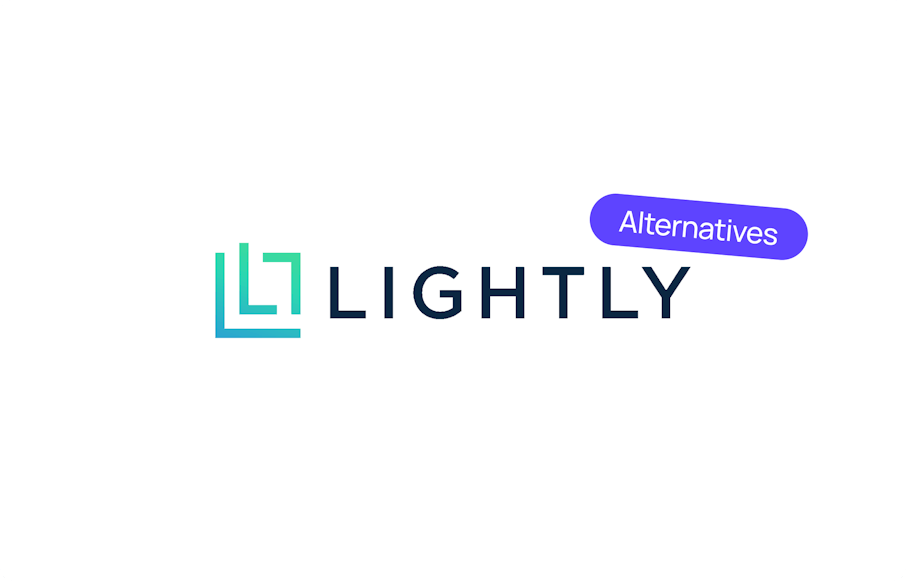
In the ever-evolving era of Artificial Intelligence (AI), there is a constant ingredient which is always required for the success of AI applications - ‘good quality data’. Generating accurate data and managing it effectively is extremely important for all the companies hence it necessitates the need to have access to good data annotation platforms. According to an analysis report by Grand View Research in 2023, the market size of data annotation tools was USD 1.02 billion and it is expected to grow at a rate of 26.5% from 2023 to 2030. Additionally, it is mentioned that nearly 45% of the surveyed companies switched more than 4 data annotation tools in a year as one tool could not suffice all their requirements. Therefore, it is imperative to study various tools available in the market and make the best choice based on one’s requirements. Let’s begin.
Lightly AI
Lightly AI is a data labeling and ML pipeline building tool which optimizes deployment cycles and data labeling costs by selecting the most relevant data. It builds active learning loops for computer vision. Although Lightly AI has been a notable player, the capabilities it offers currently are not upto the mark based on current requirements of the industry. Some of the challenges are listed below.
Challenges
- Supported Data Types: It doesn’t support a wide variety of data types including multi-modal, DICOM, etc.
- Automated Labeling: It doesn’t provide pretrained ML models to assist with data labeling pipelines.
- Integrations: Extensive integrations with various services that provide cloud storage and integrations are not offered.
However, the AI landscape is rich with alternatives, each bringing its own strengths to the forefront with their varied capabilities and cost effective solutions. In this article we will delve into the best Lightly AI alternatives, that specialize in various aspects of developing and optimizing AI lifecycles. Let’s dive right in.
1. Encord Active
Encord Active is a powerful platform which expertises in model evaluation and observability. It improves the model performance by surfacing, curating, and prioritizing the most valuable data for training and fine-tuning. Additionally, its seamless model testing features makes the models robust and ready for production.

Key Features
- AI Lifecycle: Trusted by pioneering AI teams such as Stanford Medicine and Tractable, Encord Active accelerates the AI development lifecycle through its cutting-edge model evaluation, data validation, and active learning capabilities.
- Failure Correction: Fixes underperforming models by allowing the explainability reports to be exported which uncovers the issues of failures.
- Analytics: Provides advanced analytics to detect and rectify model weak spots such as blind spots and data drift to ensure that the model stays accurate even when the data landscape changes.
- Refining Model Performance: Reduces deployment timelines by integrating humans in the loop who help to evaluate and refine the model performance iteratively by building the active learning workflows.
- Automated Error Correction: Allows automating surfacing and correction of label errors by using vector embeddings, AI assisted quality metrics and model predictions.
- Collaboration: Team members can be easily added to your workflows and can be designated roles such as annotator, admin, reviewer, and so on.
- Feedback for Improvement: Better model performance can be achieved by inspecting the model predictions and comparing them with the ground truth data, in case of any issues it can be sent back to the labeling team for further improvements.
- Advanced Search: Robust and balanced datasets which cater to the model’s needs can be easily built by using the advanced search and filter functionalities in the product.
Best For
- Teams and enterprises who want to automate, scale, and manage their AI pipelines with a focus on medical and geospatial data.
Pricing
- Offers starter, team and enterprise pricing plans.
2. Scale AI
The scale data engine includes features that allow efficient collection, curation, and annotation of data, along with fast training and evaluation of models. It generates high-quality labels, provides scalability for projects of differing volumes, and delivers data variety to improve model performance.

Key Features
- Overall Capabilities: The Generative AI Data Engine of Scale AI provides capabilities for RLHF, data generation, model evaluation, and safety and alignment.
- Data Labeling: For data labeling, data types of 3D, image, mapping, text, and audio are supported. Its data labeling solution combines AI techniques with humans in the loop to generate quality data efficiently.
- Dataset Management Tool: ‘Label what matters’ with the intelligent dataset management tool, which helps to select the highest value data by maintaining the labeling budget.
- Effective Model Evaluation: Its set of model testing, evaluation, and model comparison tools also helps to curate data smartly, sometimes even without ground truth labels.
- Access to Pretrained Models: Enterprises can create, structure, or modify their data using the leading foundational models of OpenAI, Anthropic, and Google PaLM.
Best For
- Individuals and teams focused on improving their data with advanced generative AI capabilities.
Pricing
- Does not explicitly mention pricing plans. Provides sales contact instead.
3. iMerit
iMerit is an end-to-end data annotation platform for Enterprise AI. It provides ready-to-use workflows for specific industry use cases and follows a strategy of automate, annotate, and analyze by keeping experts in the loop to deliver high-quality solutions at scale.

Key Features
- Gen AI-based Data Labeling: Ango Hub is iMerit’s data annotation platform which works on a Gen AI framework to provide data labeling services for industries such as Medical AI and Precision Agriculture.
- Annotation Offerings: Provides annotation services for video, text, image, and LiDAR data with integrated features like APIs, webhooks, and custom dynamic workflows.
- Annotation Types: Supports multiple annotation types such as bounding boxes, polygons, keypoints, polylines, and many more.
- ML Assisted Labeling: ML-assisted auto-labeling can be done using their integrated plugin library for pre-labeling.
- No Code Integrations: Data pipelines can be easily taken to production level with their no-code integrations with services such as AWS, Google Cloud, Azure, and external APIs.
Best For
- Enterprises focused on solving industry use cases in agriculture or medical AI and want to deliver their solutions at scale with easy production.
Pricing
- Does not explicitly mention pricing plans.
4. Dataloop
Dataloop is a tool for all the blocks required to build a complete AI pipeline. The platform offers functionality to connect with any data source, state-of-the-art models, the ability to compose custom workflows, reusable elements, humans in the loop, and pre-built AI workflows.

4-points to polygon annotation by Dataloop
Key Features
- Speedy Workflows: Allows easy collaboration amongst large data teams with easy-to-integrate human feedback capabilities which can ultimately speed up the time spent on building workflows.
- Gen AI for LLMs: Provides features to build GenAI-based multimodal pipelines using off-the-shelf or fine-tuned Large Language Models (LLMs), incorporating Retrieval Augmented Generation (RAG) techniques, and leveraging foundational models.
- Supported Data Types: Supports unstructured data such as image, video, text, JSON, Lidar, audio, and GIS.
- Production Grade Features: Provides production-grade AI features such as removing the overhead of managing external tools such as AWS and Azure by allowing the compute to be scaled across the entire AI workflow.
- Active Learning: Enables active learning in production by allowing automatic integration of human feedback back into the models. The integrated platform combines multiple elements of active learning such as data management, RLHF, and model training.
- Cloud Compute: One of their interesting workflow capabilities is chaining multiple cloud compute nodes from different vendors all in a single pipeline.
Best For
- Individuals, teams, and enterprises building dynamic workflows and wanting to develop and deliver solutions quickly.
Pricing
- For information on pricing, contact sales or fill out the request form for more details.
5. SuperAnnotate
SuperAnnotate empowers enterprises to build, fine-tune, iterate, and manage their custom AI models by providing a high-quality of training data with model-assisted labeling resulting in reduced error rate and time spent on creating annotations.

Data Management Platform by SuperAnnotate
Key Features
- Data Annotation: Supports data annotation for multiple data types such as image, video, audio, text, tiled, and LLM & Gen AI. It’s advanced tools to create accurate training data.
- Data Management and Querying: Provides data management and curation features such as querying and debugging to find relevant data, obtain data insights by visualizing data trends, and advanced data versioning capabilities.
- MLOps: Allows creating CI/CD AI pipelines with their python SDKs, webhooks, and inbuilt neural networks. Provides advanced orchestration to automate complex ML processes with low-code tools.
- Annotation Services: Provides access to a huge and diverse annotation services marketplace with over 400 trained and professionally managed annotation teams. They offer expertise on projects across various industries and speak up to 18 languages.
Best For
- Enterprises focused on annotating and managing huge amounts of raw data rather than deploying their solutions to production. requiring high quality training data
Pricing
- Offers Free, Pro, and Enterprise plans.
6. Labelbox
Labelbox is an all in one data-centric AI platform for creating AI ready datasets, evaluating model outputs, training and tuning LLMs, scaling RLHF and building intelligent applications in general.

Key Features
- Model Foundry: Contains a foundry of state-of-the-art foundation models to enrich the data, automate tasks, and build pipelines for applications across vision and language models. Supports building systems such as object detection, segmentation, chatbots, knowledge assistants, and generative AI applications.
- Annotation Types: Supports annotation of image, video, text, document, RLHF, audio, medical, and geospatial data types. Allows for the creation of dynamic workflows by filtering on various attribute types to increase labeling efficiency with less time.
- Advanced Data Searching: Leverages metadata, vector embeddings, and annotations to provide an advanced way of searching unstructured data for creating datasets.
- Model Assisted Labeling: Supports model-assisted labeling by offering a variety of options for foundation models such as Google Gemini Pro, Llama 2, and Grounding DINO.
- Analytics Platform: Provides an advanced analytics platform to review the performance of a project by visualizing it’s throughput, quality, and efficiency across a dashboard.
- LLM Evaluation: Empowers human-centric LLM evaluation by providing capabilities for selection, benchmarking, ranking, NER, and classification.
Best For
- Developers, researchers, and teams building applications across vision and language use cases, and requiring flexible usage policy.
Pricing
- Offers Free, Starter, and Enterprise plans. Labelbox Units (LBUs) are available based on pay per use policy.
7. Aquarium
Aquarium is a ML data curation platform to surface the critical errors that hinder model performance and improve them using the right data with their embeddings. It supports only vision-related data types for tasks such as classification, segmentation, 2D and 3D object detection.

Key Features
- Automated Workflows: Provides AI-powered workflows to speed up model improvement by surfacing the errors without requiring human effort.
- Cloud for Production: Supports production workflows by providing fully managed cloud infrastructure that handles the tasks of generating, processing, and querying embeddings.
- Collaboration: Provides an easy-to-collaborate platform for data labeling and analysis, which makes sharing tasks and assigning issues to other teammates hassle free.
- Automation and Integration: Provides integrations with Python API, data storage services, and frameworks such as PyTorch and TensorFlow.
Best For
- Individuals and small teams looking to enhance their vision data and remove critical errors.
Pricing
- Provides Starter, Team, Business, and Enterprise plans.
8. Voxel51
FiftyOne (developed by Voxel51) is an open source toolkit for building computer vision workflows with enhanced data quality. It provides features for curating high quality datasets, and evaluating models.

Dataset Management Feature by Voxel51
Key Features
- Public Dataset Integrations: Provides integrations with largely popular public datasets such as COCO and Open Images. Also allows creating custom datasets from scratch.
- Automatic Error Identification: Helps to automatically identify, visualize, and correct the label mistakes which cause poor model performance.
- VoxelGPT: Provides an AI assistant for computer vision as a plugin called ‘VoxelGPT’ which organizes and explores data based on natural language prompts.
- Easy Image Search: Allows easy searching through billions of images with their advanced vector search integrations, which have capabilities such as reverse image search and semantic document search.
- Collaboration: Enables secure collaboration with FiftyOne Teams either on-premises or in the cloud, which allows access to all the workflows built with FiftyOne. Provides cloud-based media storage easily accessible from the browser or Python SDK.
Best For
- Individuals and teams looking to build custom computer vision workflows, starting from creating datasets to evaluating models for production-readiness.
Pricing
- Does not explicitly mention pricing plans; contact sales.
9. Aporia
Aporia is an AI control platform which provides real-time control over AI apps with its two major technology stacks - Aporia Guardrails and Aporia Observe. The former focuses on GenAI integrity and AI security while the latter is about model monitoring, observation, and evaluation.

Key Features
- Responsible LLM Interactions: Provides real-time hallucination mitigation, blocks prompt injection attempts, prevents off-topic conversations, and builds custom AI policies to ensure responsible interactions.
- Integration: Offers easy integration of GenAI guardrails with a single API call.
- Insights: Generates user-engagement insights based on LLM interactions and offers budget tracking by monitoring costs of queries and tokens.
- ML Observability: Offers ML observability features such as dynamic dashboards, model monitoring, root cause analysis, and explainability.
Best For
- Individuals, small teams, and enterprises focused on AI security, gaining insights, and monitoring the outcomes of ML models.
Pricing
- Provides Guardrails Trial (free), Guardrails Pro, and Guardrails Enterprise (custom) plans.
10. Picsellia
Picsellia is a unified platform to build, deploy, and improve all Computer Vision (CV) related products. It offers a complete MLOps stack to build and manage data, manage models, perform continuous CI/CD and implement serverless model deployment.

Key Features
- Supported Data Types: The annotation tool supports various data types including multispectral images. It enhances the data annotation efficiency with model-assisted labeling and allows seamless collaboration within the team.
- Experiment Tracking: Provides experiment tracking to help compare different experiments which assists to choose the best performing model based on the metrics.
- Deployment: Provides serverless deployment service based on pay-as-you-go model.
- Model Analysis: Allows real-time model performance analysis and identifies edge-cases to further improve the model.
Best For
- Individuals and small teams focused on building and deploying computer vision solutions.
Pricing
- Offers Standard, Business, and Enterprise along with custom plans.
Lightly AI Alternatives: Key Takeaways
Lightly AI Limitations:
- Lightly AI offers very limited features. Some of the main concerns are its limited support to data types allowed, access to few integrations to build workflows, and unavailability of pre-trained models.
- Additionally, it does not offer the latest Gen AI and LLM based integrations and support for applications.
Alternatives to Lightly AI:
- Offer a broad set of features and capabilities for building AI lifecycles.
- Extensive repositories of pre-trained and ready-to-use application oriented models.
- Scalable model building, monitoring, testing, and production services.
- Automations with Gen AI and integrated support for LLMs.
Explore our products
